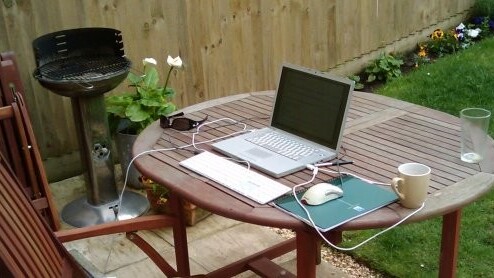
O2 is today launching what’s it’s calling “the biggest flexible working initiative of its kind,” as it lets a quarter of its 12,000-strong workforce work remotely for the day.
Employees at the UK mobile operator’s Slough HQ will carry out their daily duties as normal, except they’ll be working from home – or another suitable ‘remote’ location, as O2 closes the doors and switches off the lights at its 200,000 sq ft offices near London.
As we reported yesterday, O2 is setting out its Think Big Blueprint, as it seeks to implement an extensive set of measures to make its business more sustainable. It’s pledging to halve the CO2 emissions of its network and to reduce the volume of carbon emitted by the company itself and its customers by 4 million tonnes a year.
The flexible working pilot aims to “push the boundaries” of what can be achieved through flexible working arrangements. However, it seems that it actually has at least one eye on the Olympic Games this year, with travel disruption a likely by-product of the swarm of tourists that will descend upon the city this summer. It’s thought that as many as one third of the UK’s businesses will encourage staff to work flexibly this summer, and O2 plans to share its findings from today’s pilot with other organisations in the build up to the sporting extravaganza this year.
Beyond the Olympics
O2 is also hoping that today’s trial will act as a test-bed for future scenarios beyond the Olympics, with flexible working helping to increase efficiency, productivity and innovation. O2 will look at reductions in its electricity usage, CO2 emissions and travel time. The company’s three year sustainability plan pledges to help over 125,000 business employees work flexibly, and collectively save over 500,000 miles of travel and over 160,000 thousand tonnes of carbon emissions.
“We believe a cultural step-change is underway affecting staff and businesses, as work increasingly becomes something we do, rather than a place that we go,” says O2 Business Director, Ben Dowd. “Today’s office-wide flexible working initiative is an opportunity for us to take the next step on our flexible working journey and tangibly demonstrate the opportunity and potential available to British businesses today.
“We practice what we preach,” continues Dowd, “and by asking O2 employees to work together as a team to test the company’s flexible working practices for themselves, we want to show that there are no limits – no matter how big or small your business is. By sharing experiences from across our business, from business divisions to operations, we hope to encourage more organisations to help their workforce become mobile.”
For the last two months, a team of 20 people has been working behind the scenes to prepare for O2’s first ever fully flexible working day, ensuring that its employees can access the necessary tools, services and support to work remotely.
Work Wise UK is a not-for-profit initiative which aims to make the UK one of the most progressive economies in the world by encouraging the widespread adoption of smarter working practice. Philip Flaxton, Chief Executive at Work Wise, reckons the Olympics is a good time for UK firms to start thinking more progressively.
“This summer marks an important opportunity for British businesses to demonstrate that we’re a forward thinking nation when it comes to our working practices – beginning by ensuring their staff and operations are prepared for every eventuality,” he says. “Flexible working is a critical part of our business culture today. Set against a challenging economic backdrop, productivity and efficiency are the key ingredients that help to drive market success for organisations and by allowing employees to shape their own working environment, businesses can inject a sense of trust and commitment to their workforce that will yield countless rewards.”
Get the TNW newsletter
Get the most important tech news in your inbox each week.




